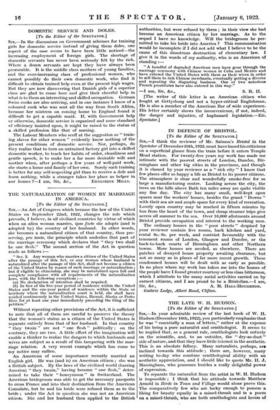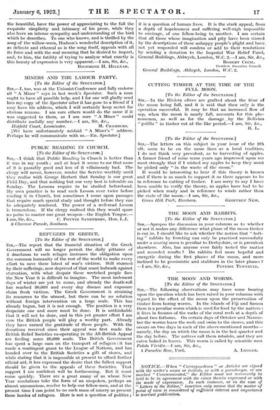THE LATE W. H. HUDSON.
[To the Editor of the SPECTATOR.]
Sia,—In your admirable review of the last book of W. H. Hudson (December 16th, 1922), you particularly emphasize that he was " essentially a man of letters," rather at the expense of his being a pure naturalist and ornithologist. It seems to be implied that, as a general rule, ornithologists look entirely on the scientific, and, to an outsider, the " dry-as-dust " side of nature, and that they have little interest in the aesthetic. This is an absolute fallacy. Many naturalists, perhaps, an inclined towards this attitude ; there are, however, many writing to-day who combine ornithological ability with an aesthetic appreciation, and I should like to quote Mr. H. J. Massingham, who possesses besides a really delightful power of expression.
To separate the naturalist from the artist in W. H. Hudson is impossible ; I think that his attitude towards Matthew Arnold in Birds in Town and Village would alone prove this. The comparatively few who are lucky enough to possess a liking for beauty equally in a missel-thrush and in a poem on a missel-thrush, who are both ornithologists and lovers of the beautiful, have the power of appreciating to the full the exquisite simplicity and intimacy of his prose, while they also have an intense sympathy and understanding of the bird which he describes. To one who knows, and is thrilled by the song of the willow-wren, Hudson's wonderful description of it, as delicate and ethereal as is the song itself, appeals with all its force and with the real meaning that he desired to impart, and, to him, the futility of trying to analyse what exactly is this beauty of expression is very apparent.—I am, Sir, &c.,
RICHMOND H. HELLYAR.



















































 Previous page
Previous page